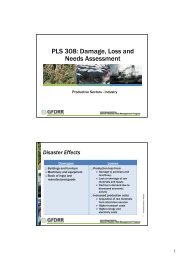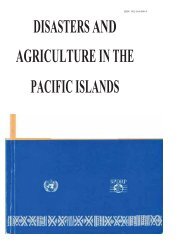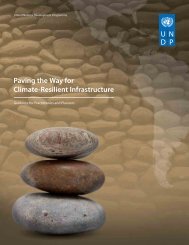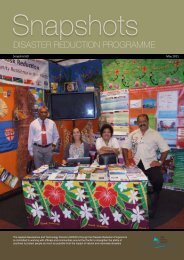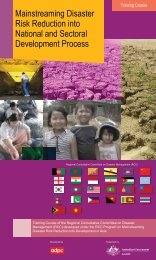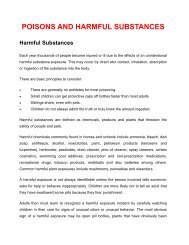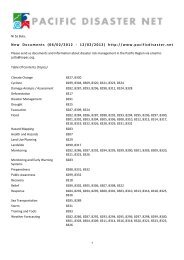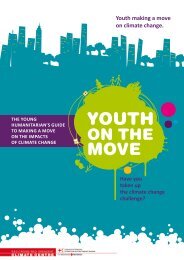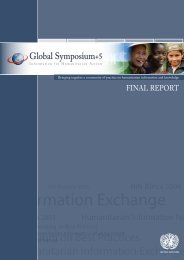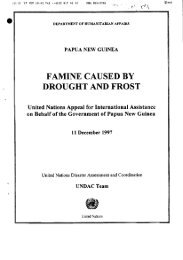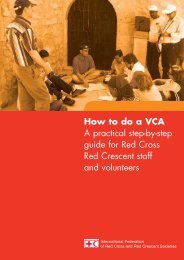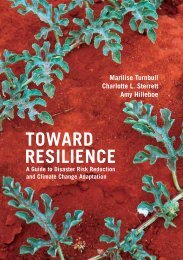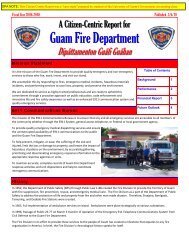A global review of disaster reduction initiatives - Welcome to the ...
A global review of disaster reduction initiatives - Welcome to the ...
A global review of disaster reduction initiatives - Welcome to the ...
You also want an ePaper? Increase the reach of your titles
YUMPU automatically turns print PDFs into web optimized ePapers that Google loves.
6Living with Risk: A <strong>global</strong> <strong>review</strong> <strong>of</strong> <strong>disaster</strong> <strong>reduction</strong> <strong>initiatives</strong>The UNEP Awareness and Preparedness forEmergencies at a Local Level (APELL), basedat <strong>the</strong> Industry and Environment Office inParis, is a programme serving as a <strong>to</strong>ol for<strong>disaster</strong> prevention and preparedness and raisespublic awareness <strong>of</strong> <strong>the</strong> need <strong>to</strong> reduce environmentalemergencies and damage. It seeks <strong>to</strong>minimize, particularly in developing countries,<strong>the</strong> occurrence and harmful effects <strong>of</strong> technologicalaccidents and emergencies resultingfrom human activity or as <strong>the</strong> consequence <strong>of</strong>natural <strong>disaster</strong>s.Web site:ww.uneptie.org/pc/apell/<strong>disaster</strong>s/<strong>disaster</strong>s.htmlWorld Food Programme (WFP)WFP is mandated by <strong>the</strong> United Nations <strong>to</strong>combat <strong>global</strong> hunger. Based in Rome, Italy,<strong>the</strong> Programme counts 85 country <strong>of</strong>fices andeight regional <strong>of</strong>fices <strong>to</strong> assist populations inneed. As <strong>the</strong> food-aid arm <strong>of</strong> <strong>the</strong> UnitedNations, WFP meets emergency needs,provides <strong>the</strong> necessary logistics <strong>to</strong> deliver foodand supports economic and social developmentby promoting policies, strategies and operationsfor <strong>the</strong> benefit <strong>of</strong> <strong>the</strong> poor and hungry.WFP has been a member <strong>of</strong> <strong>the</strong> ISDR Inter-Agency Task Force on Disaster Reductionsince its inception in 2000.In 1999 <strong>the</strong> WFP key strategy document entitledEnabling Development identified <strong>disaster</strong>mitigation as one <strong>of</strong> <strong>the</strong> five priority areas <strong>of</strong>action with a focus on <strong>reduction</strong> <strong>of</strong> <strong>the</strong> impact<strong>of</strong> natural hazards on food security for vulnerablepopulations. A steering committee for <strong>disaster</strong>mitigation was established <strong>to</strong> assist countryand regional <strong>of</strong>fices <strong>to</strong> integrate <strong>disaster</strong> mitigationactivities in<strong>to</strong> <strong>the</strong>ir developmentprogrammes. The WFP dual mandate fordevelopment and emergencies results in developmentactivities designed <strong>to</strong> facilitate potentialemergency response. Guidelines on <strong>disaster</strong>mitigation have been prepared and field-testedin pilot country <strong>of</strong>fices. The formalization <strong>of</strong><strong>the</strong> WFP role in <strong>disaster</strong> mitigation is reflectedin <strong>the</strong> new generation <strong>of</strong> programming documents.In 2000 already nine <strong>of</strong> <strong>the</strong> 11 CountryStrategy Outlines and Country Programmesthat were approved by <strong>the</strong> Executive Board hadincluded <strong>disaster</strong> mitigation activities. Forexample, WFP is supporting water harvestingin Sudan <strong>to</strong> decrease <strong>the</strong> impact <strong>of</strong> drought onrural livelihoods. In Tanzania, <strong>the</strong> WFP CountryProgramme is using food-for-work activities<strong>to</strong> create assets, such as grain s<strong>to</strong>res and accessroads, in order <strong>to</strong> improve long-term food securityand decrease <strong>the</strong> vulnerability <strong>of</strong> households<strong>to</strong> drought.The WFP emphasis on early warning andcontingency planning includes collaborationwith <strong>the</strong> Framework Team based in New Yorkand <strong>the</strong> WFP Vulnerability and AnalysisMapping Unit (VAM). The Office <strong>of</strong> <strong>the</strong>Humanitarian Adviser (OHA) is responsiblefor coordinating <strong>the</strong> overall contingency planningprocess, while <strong>the</strong> Augmented LogisticsIntervention Team for Emergencies (ALITE)collates specific logistics-based contingencyplanning information such as logistics capacityassessments (LCAs).WFPVia C.G. Viola 68Parco dei Medici00148 Rome, ItalyTel: (+39-06) 65131Fax: (+39-06) 6513 2840E-mail: wfpinfo@wfp.orgWeb site: www.wfp.orgUnited Nations Children's Fund(UNICEF)UNICEF headquarters are based in NewYork. UNICEF has regional <strong>of</strong>fices and country<strong>of</strong>fices in 162 countries and terri<strong>to</strong>riesaround <strong>the</strong> world. The UNICEF mandate <strong>to</strong>protect and improve <strong>the</strong> well-being <strong>of</strong> <strong>the</strong> mostvulnerable groups, children and women,anywhere in <strong>the</strong> world, by definition, includes<strong>the</strong> aspect <strong>of</strong> <strong>disaster</strong> preparedness and prevention.By supporting empowerment <strong>of</strong> communitiesat <strong>the</strong> local level and capacity-building at<strong>the</strong> national level, UNICEF programmesenhance abilities <strong>to</strong> deal with <strong>disaster</strong>s and <strong>to</strong>mitigate <strong>the</strong> negative effects <strong>of</strong> <strong>disaster</strong>s. Policyand procedural guidelines for UNICEFstaff in emergencies include both emergencyresponse and preparedness/prevention activities.310



